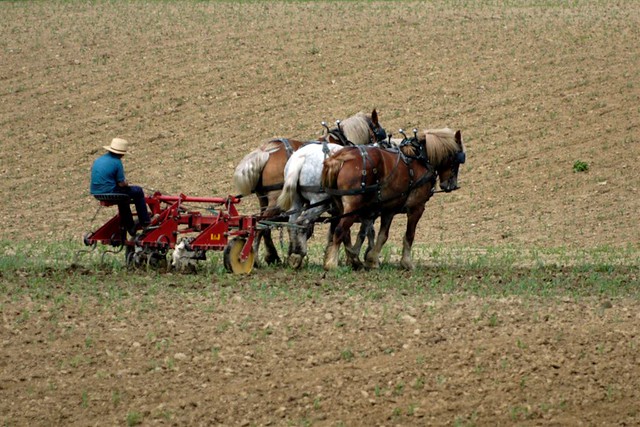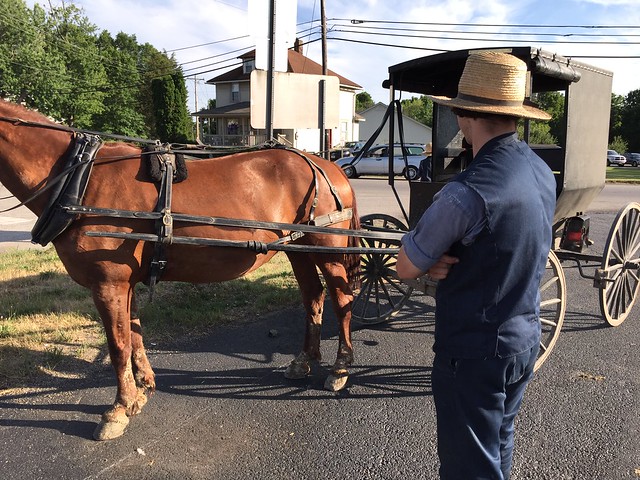Concerned about the pandemic, my wife and I waited until this last July before driving out to a nearby valley, known as “Sinking Valley,” to shop for fresh fruits and vegetables in the Amish markets we normally patronize. Over the years, we have become quite familiar with the proprietors—we address each other with our first names, discuss our families, and share stories. Small talk. And they sell great food. But we were nervous about venturing among them this summer—we had heard they don’t wear masks.

And the rumors were correct. None of the Amish we saw wore face masks. Why not? We kept asking each other this question as we drove home, vowing to avoid shopping at their markets again until things changed and they started accepting government directives about social distancing and the use of masks.
We wondered if the answer might be that they had accepted the prevailing conservative mindset of Blair County to dismiss the directives of the Pennsylvania government about the health crisis. But we were off target. The Amish have a more complex set of objections to wearing face masks, as explained by a news story published on January 17.
The in-depth report was published by the Coshocton Tribune, a paper based in central Ohio where questions about the large Amish settlements around Holmes County come up frequently. The journalist focused her article primarily on the work of Prof. Cory Anderson, a faculty member at the Pennsylvania State University who does a lot of research on the Ohio Amish communities.
According to Dr. Anderson, the Amish objection to wearing face masks is partly based on a strong suspicion about what others, particularly people from government agencies, tell them. They associate wearing masks with fear and, he said, “as a people, they have a value orientation toward minimizing problems. They try to portray that all is at peace and rest. They’re willing to make masks—they’re not necessarily willing to wear them.”

Furthermore, he said that in Holmes and Wayne Counties, which are heavily Amish, the culture is strongly oriented toward business, with an emphasis on autonomy from government and an absence of regulations. He characterized it as a local attitude rather than a political concern.
Part of the reason for their attitude derives from their theology and history. He described the Amish history of persecution in Europe which promoted a culture of suspicion about the intentions of outsiders who come into their communities and try to tell them what to do.
Anderson said that another reason the Ohio Amish reject directives from outsiders is the local economy. They feel that the reason their strong tourism industry functions well is that it is self-regulating, which argues against government interference.
Their suspicion about masking in Ohio was fostered by what they felt was unevenness of public policies right from the outset of the pandemic. Last spring they were, in fact, willing to comply with social distancing guidelines, even to closing their businesses and curtailing their worship services. He said it was quite amazing that they did that willingly.
Anderson added that the Amish cherish the fact that they have their own ways of doing things. They are afraid that if they accept the ways outsiders do things, their own power structures and pecking orders will be disrupted.

This article quotes other experts on issues relating to the Ohio Amish but the major focus is on the expertise of Dr. Anderson. He argues that the Amish are opposed to people getting individual attention, so they resist making any modifications in their appearance. They all want to look alike. This resistance to looking different prompts their opposition to wearing masks.
Another factor that plays a role in hindering the acceptance of masks is the Amish belief in spiritual healing. They believe in yielding their health to what God wants for them. For that reason, many also resist getting vaccinated.
Not all of these factors would apply to the Amish in Sinking Valley, however. One family we know took their seriously ill child to a major medical research hospital in Pennsylvania for the advanced care that was available. But my wife and I did not feel comfortable in approaching the Amish proprietors about the reasons they don’t wear masks. Better to wait for an article such as this one and the analysis of an expert on the subject.